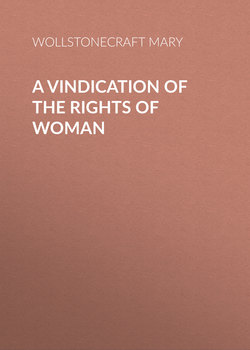A Vindication of the Rights of Woman

Реклама. ООО «ЛитРес», ИНН: 7719571260.
Оглавление
Wollstonecraft Mary. A Vindication of the Rights of Woman
A BRIEF SKETCH OF THE LIFE OF MARY WOLLSTONECRAFT
TO M. TALLEYRAND PERIGORD, LATE BISHOP OF AUTUN
INTRODUCTION
CHAPTER 1. THE RIGHTS AND INVOLVED DUTIES OF MANKIND CONSIDERED
CHAPTER 2. THE PREVAILING OPINION OF A SEXUAL CHARACTER DISCUSSED
CHAPTER 3. THE SAME SUBJECT CONTINUED
CHAPTER 4. OBSERVATIONS ON THE STATE OF DEGRADATION TO WHICH WOMAN IS REDUCED BY VARIOUS CAUSES
CHAPTER 5. ANIMADVERSIONS ON SOME OF THE WRITERS WHO HAVE RENDERED WOMEN OBJECTS OF PITY, BORDERING ON CONTEMPT
SECTION 5.1
SECTION 5.2
SECTION 5.3
SECTION 5.4
SECTION 5.5
CHAPTER 6. THE EFFECT WHICH AN EARLY ASSOCIATION OF IDEAS HAS UPON THE CHARACTER
CHAPTER 7. MODESTY COMPREHENSIVELY CONSIDERED AND NOT AS A SEXUAL VIRTUE
CHAPTER 8. MORALITY UNDERMINED BY SEXUAL NOTIONS OF THE IMPORTANCE OF A GOOD REPUTATION
CHAPTER 9. OF THE PERNICIOUS EFFECTS WHICH ARISE FROM THE UNNATURAL DISTINCTIONS ESTABLISHED IN SOCIETY
CHAPTER 10. PARENTAL AFFECTION
CHAPTER 11. DUTY TO PARENTS
CHAPTER 12. ON NATIONAL EDUCATION
CHAPTER 13. SOME INSTANCES OF THE FOLLY WHICH THE IGNORANCE OF WOMEN GENERATES; WITH CONCLUDING REFLECTIONS ON THE MORAL IMPROVEMENT THAT A REVOLUTION IN FEMALE MANNERS MIGHT NATURALLY BE EXPECTED TO PRODUCE
SECTION 13.1
SECTION 13.2
SECTION 13.3
SECTION 13.4
SECTION 13.5
SECTION 13.6
Отрывок из книги
M. Wollstonecraft was born in 1759. Her father was so great a wanderer, that the place of her birth is uncertain; she supposed, however, it was London, or Epping Forest: at the latter place she spent the first five years of her life. In early youth she exhibited traces of exquisite sensibility, soundness of understanding, and decision of character; but her father being a despot in his family, and her mother one of his subjects, Mary, derived little benefit from their parental training. She received no literary instructions but such as were to be had in ordinary day schools. Before her sixteenth year she became acquainted with Mr. Clare a clergyman, and Miss Frances Blood; the latter, two years older than herself; who possessing good taste and some knowledge of the fine arts, seems to have given the first impulse to the formation of her character. At the age of nineteen, she left her parents, and resided with a Mrs. Dawson for two years; when she returned to the parental roof to give attention to her mother, whose ill health made her presence necessary. On the death of her mother, Mary bade a final adieu to her father's house, and became the inmate of F. Blood; thus situated, their intimacy increased, and a strong attachment was reciprocated. In 1783 she commenced a day school at Newington green, in conjunction with her friend, F. Blood. At this place she became acquainted with Dr. Price, to whom she became strongly attached; the regard was mutual.
It is said that she became a teacher from motives of benevolence, or rather philanthropy, and during the time she continued in the profession, she gave proof of superior qualification for the performance of its arduous and important duties. Her friend and coadjutor married and removed to Lisbon, in Portugal, where she died of a pulmonary disease; the symptoms of which were visible before her marriage. So true was Mary's attachment to her, that she entrusted her school to the care of others, for the purpose of attending Frances in her closing scene. She aided, as did Dr. Young, in "Stealing Narcissa a grave." Her mind was expanded by this residence in a foreign country, and though clear of religious bigotry before, she took some instructive lessons on the evils of superstition, and intolerance.
.....
Dr. Gregory goes much further; he actually recommends dissimulation, and advises an innocent girl to give the lie to her feelings, and not dance with spirit, when gaiety of heart would make her feet eloquent, without making her gestures immodest. In the name of truth and common sense, why should not one woman acknowledge that she can take more exercise than another? or, in other words, that she has a sound constitution; and why to damp innocent vivacity, is she darkly to be told, that men will draw conclusions which she little thinks of? Let the libertine draw what inference he pleases; but, I hope, that no sensible mother will restrain the natural frankness of youth, by instilling such indecent cautions. Out of the abundance of the heart the mouth speaketh; and a wiser than Solomon hath said, that the heart should be made clean, and not trivial ceremonies observed, which it is not very difficult to fulfill with scrupulous exactness when vice reigns in the heart.
Women ought to endeavour to purify their hearts; but can they do so when their uncultivated understandings make them entirely dependent on their senses for employment and amusement, when no noble pursuit sets them above the little vanities of the day, or enables them to curb the wild emotions that agitate a reed over which every passing breeze has power? To gain the affections of a virtuous man, is affectation necessary?
.....